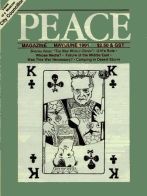
Peace Magazine May-Jun 1991, page 5. Some rights reserved.
Search for other articles by Erik Poole here
WHEN THE NDP WAS SWEPT to power in the summer of 1990 in Ontario, they later took with them Simon Rosenblum of Project Ploughshares. Simon now works as the political policy advisor to Floyd Laughren, the Treasurer and Deputy Premier-a position of power that would hardly have been imaginable only a few months earlier.
Simon's involvement with the NDP goes back to the late 1960s when he was a member of the radical nationalist wing called the "Waffle." Since 1978 he has sat on the provincial council of the NDP and since 1985 he has been one of 6 vice-presidents of the Ontario NDP. Simon Rosenblum and Floyd Laughren met through the party in 1987 when Floyd was already a MPP. Both have taught in Sudbury, Ontario at various times. Simon lectured in sociology at Leurentian University; Floyd taught economics at Cambrian College. Both of them are on the left of the NDP, both are ardent economic nationalists. Simon's interest in peace issues stems from the late 1970s about the time of the significant turn in U.S. weapons policy and move to counterforce and nuclear-targeting strategies. In 1981 he helped form the Sudbury chapter of Project Ploughshares. In 1985, he became the political affairs coordinator of Project Ploughshares and was based in Ottawa. Roughly half his time was spent on Parliament Hill working as Canada's only full time peace lobbyist. But he also helped organize extra-parliamentary campaigns such as "On Track." And he spent much time doing research and writing for the Ploughshares Monitor and the numerous books on peace and disarmament issues that he has written or edited. He is the co-editor of social democrats scheduled to appear in early 1991. On the "Hill," he worked much of the time through standing committees acting as a conduit for Project Ploughshares' re-search and advocacy.
Because of Project Ploughshares's organizational abilities and breadth of the constituencies it represented, Simon feels that it was "a force to be reckoned with, a serious agent of social change." And a force for tangible progress on Parliament Hill. When asked if community consciousness raising might be a more effective way of struggling for lasting change than lobbying, he replied that it would be a terrible mistake to give undue focus to either end of the equation. Raising awareness at the grass-roots level and directing energies at the political level are equally important.
In Ottawa, Simon believes that his organization was able to affect the opposition parties through education and sustained contact, and perhaps to moderate some-what the peace and security policies of the Conservative government. He cites Canada's decision to avoid official involvement in Star Wars as a Project Ploughshares victory. As for the decision to not go ahead with the nuclear powered submarines, Project Ploughshares was but one of many groups responsible for that achievement. Simon credits his organization for raising the profile of foreign aid as a security question and the government backing away on modernizing nuclear weapons in Europe such as the Lance missile. Arms trade is now treated seriously, primarily due to Project Ploughshares's efforts. He feels that Project Ploughshares can take much of the credit for influencing the peace movement away from its focus on single weapon systems to broader issues such as common security.
FRUSTRATIONS? Yes! That the Cruise missile tests continued unabated was a major disappointment. Participating in the political process often has its frustrating moments. But now Simon will be able to participate from the other side of the fence in a small way or, in his words: "help to set the Canadian political agenda with implications for foreign policy down the road." In so far as the Ontario NDP is successful, this will help the federal NDP, which will in turn have an impact on foreign policy. Furthermore: "Any structural economic change in Ontario will make industrial military conversion easier." One day he hopes to go back to peace work. In the meantime, we wish him good luck.
Erik Poole lives in Toronto and is an associate editor of PEACE.

Peace Magazine May-Jun 1991, page 5. Some rights reserved.
Search for other articles by Erik Poole here